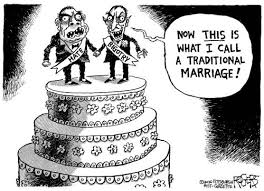 |
No matter what side you're on, we can
all agree: these people are doing it wrong. |
I usually don't hesitate in addressing controversial topics, but I'll admit, I'm pretty hesitant on whether I want to address this issue, the gay marriage debate, mostly because its moved beyond rational arguments and into the realm of slogan wars, glitter-bombing, and fast-food political statements (I honestly did not see that one coming). In the modern climate of the debate, there's a lot of hatred (on both sides), miseducation (also, on both sides), and general stupidity (we're all in the same boat on this one folks). Its pretty apparent why I'm not all super-enthusiastic to throw my 2 cents worth into the fray. I'm okay with people calling me wrong, or stupid, or just plain antiquated. But calling me hateful? That's plain ridiculous. I'm not hateful, I'm just being rational. Now, if you can quell that fiery rage that you may be holding for me deep in the recesses of your soul and listen to what I, a sane, rational person, have to say, I will explain why I'm not hateful.
As a Catholic, I can assure you that hatred has nothing to do with it. The Catechism of the Catholic Church 2358 states rather clearly, "The number of men and women who have deep-seated homosexual tendencies is not negligible. This inclination, which is objectively disordered, constitutes for most of them a trial.
They must be accepted with respect, compassion, and sensitivity. Every sign of unjust discrimination in their regard should be avoided. These persons are called to fulfill God's will in their lives and, if they are Christians, to unite to the sacrifice of the Lord's Cross the difficulties they may encounter from their condition." (italics and bold mine). When I see actions of hatred and discrimination against homosexuals, I'm every bit as flamed. No human, regardless of orientation, ought to be discriminated against for qualities that are out of their control. Being gay is not a grounds for dehumanization any more than being black, being woman, being disabled, or any other trait. (Being unborn? #thoughttrolling). I see the Westboro Baptist Church protesting on street corners and I'm incensed. I can't stand the idea of people being hated for something out of their control.
Many people have drawn parallels between the LGBT Movement and the Civil Rights Movement, some claiming that the fight for gay marriage is directly analogous to the fight for desegregation. I've also discovered that this comparison has swayed a lot of people to supporting the cause for gay marriage, mostly because they don't want to be remembered by history (or their grandchildren) as the 21st century version of racists. And who would want that stigma on their legacy? I'd hate to check the history books and see a picture of my grandparents protesting the Little Rock 9. Who wouldn't? The comparisons between gay rights and civil rights has been an effective weapon in the hands of the gay rights movement, but I think it has some critical flaws, which I'd like to point out. First things first, the Civil Rights movement was absolutely necessary. The systematic prejudice against an entire group of people on basis of their skin color was absolutely wrong, and desegregation was a great achievement of the 20th century. But LGBT is a little more complicated. (Stomach that rage, spare me the hate mail, and please keep listening.)
Being a racial minority is an amoral quality, meaning that there is absolutely no choice in the matter. Emmett Till never chose to be black, thus he had no moral responsibility for being black. There is no choice, and without choice there is no culpability, and without culpability, there's no legitimate moral consequence. This
can be paralleled over to homosexuality, but we must be careful here. In most cases of homosexuality, the attraction is inherent, and thus without moral culpability. Discriminating against a person because they have homosexual attractions is wrong, and must be avoided. However, there is a moral decision to be made here: the decision to pursue those attractions. In the Civil Rights Movement, African-Americans did not have the choice to be or not to be black. It was a quality they had outside of their ability to willfully choose it, and thus, ought not to have been held against them. In the LGBT Movement, there is a choice, the choice to pursue one's sexual attraction, thus calling into question moral legitimacy.
 |
| Is this really helpful to anybody? Really? |
People can legitimately oppose the LGBT Movement upon the the grounds that pursuing homosexual relations is objectively and morally wrong. Or at least, they can oppose the LGBT Movement without being hateful parallels of the KKK. They can enter the debate without the stigma of being hateful, vicious monsters, and instead be sane, rational people with a sane, rational view of human sexuality. They can eat at fast-food restaurants without vomiting forth hatred with every delicious chicken-y bite. Are there people that legitimately hate? Yes, absolutely. Are the wrong to hate? Undoubtedly. Can a person legitimately disagree with gay marriage? Of course.
Now that I've said that, I probably ought to address the notions of rights and marriage, specifically the large number of people steaming out the ears, foaming at the mouth (exaggeration? perhaps), demanding how we can deny another human being equal rights on basis of sexual orientation. A fair notion, perhaps, especially seeing how hot and heavy we are about rights in this nation. But is marriage a right in the first place? Did the government create marriage? Or did it affirm marriage as an institution far more ancient and authoritative than the state? Marriage is a social institution, far older than civilization, predating history itself. Governments to not make marriages, but validate social (and religious!) institutions. I have a hard time believing that all the hullabaloo is merely for some tax benefits and a legal goody basket. The LGBT movement may want state recognition of same-sex marriage, but merely for the recognition of a social change, for the redefining of the most ancient of social institutions. This isn't just about a piece of paper, this is a second sexual revolution, and must be treated with the gravity of such. The first sexual revolution was full of good intentions and had produced a load of bad statistics (for more information, read "
Adam and Eve After the Pill" by Mary Eberstadt.)
Redefining sexuality is a grave notion indeed, and ought to be given serious consideration. Call me old fashioned, but I think that the wisdom of generations past ought to be seriously considered here. Marriage has been inseparably tied to the success of human civilization since the dawn of history, not simply as two people who love each other, but as man and woman singularly committed to mutual well being and the creation of progeny. It is this definition that brought us to the modern day, and upon the foundation of this definition modern society stands. We're now given the opportunity to destroy our cultural foundation and hope that society will stand on its own, (hopefully) wiser, stronger, and more progressive than the generations before it, or reinforce those foundations, recognizing vanity for what it is and reinforcing good cultural institutions rather than blasting them to pieces like a French revolutionary on meth.
 |
| "Dismantle all the cultural institutions!" |
We tread on uncharted territory indeed, and the stakes are high. We're rewriting the principles of sexuality as pure preference rather than beautifully necessary function. Sexuality is so unique and resplendent because it has such a magnificent function, a function that resists fashion and serves to provide the very foundations of civilization from its very foundation. There is a incredible moral weight to these issues, far outweighing the notion of rights and personal freedoms. Yes, the government ought to defend the liberties of a society, but in its obligation to legislate, it must also protect society from itself (hence speed limits, bans on drugs, high explosives, and 4oz.+ containers of fluid on airplanes). If male/female marriage is (and let's be real, of course it is) the foundation of known human civilization, the government ought to very vigilant in its approval or disapproval of changing definitions of marriage.
Rather than letting this debate evolve into a shouting match in which fabricated slogans and witty bumper stickers are slung at opposing movements without any discretion or consideration, let's actually take this seriously. That goes especially for you, my fellow Christians. "Adam and Eve, not Adam and Steve" ain't cutting it anymore, and constantly reiterating "God's Plan for marriage" (while theologically true) does not constitute a binding and airtight argument. Work a little harder, fight a little truer, and for the love of God Almighty,
love thy neighbor, even (and especially) if he disagrees with you. For those of you who are still repressing your rage and indignation, thank you for your patience. We could use a few more considerate people like you. Stay classy folks.

